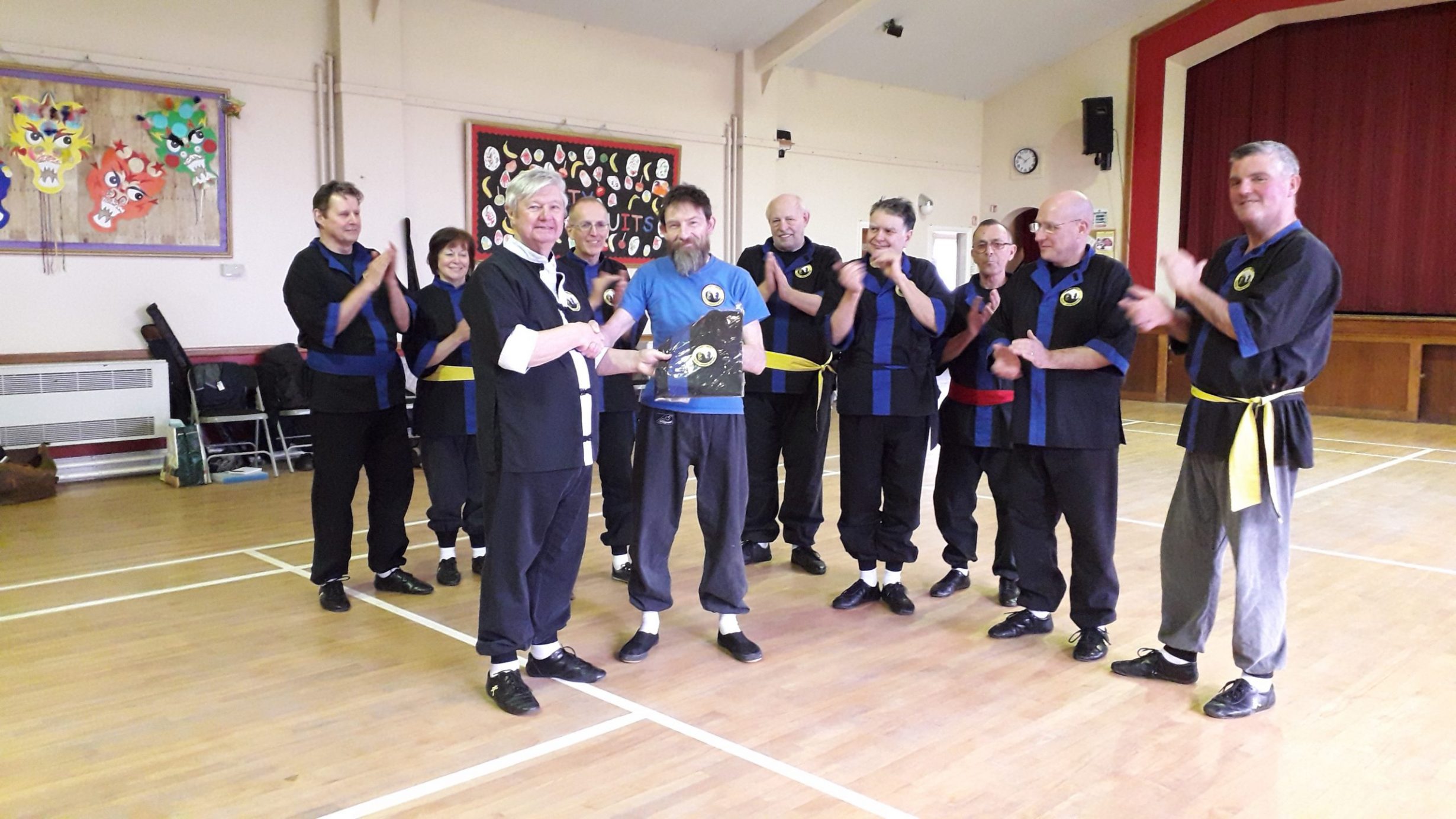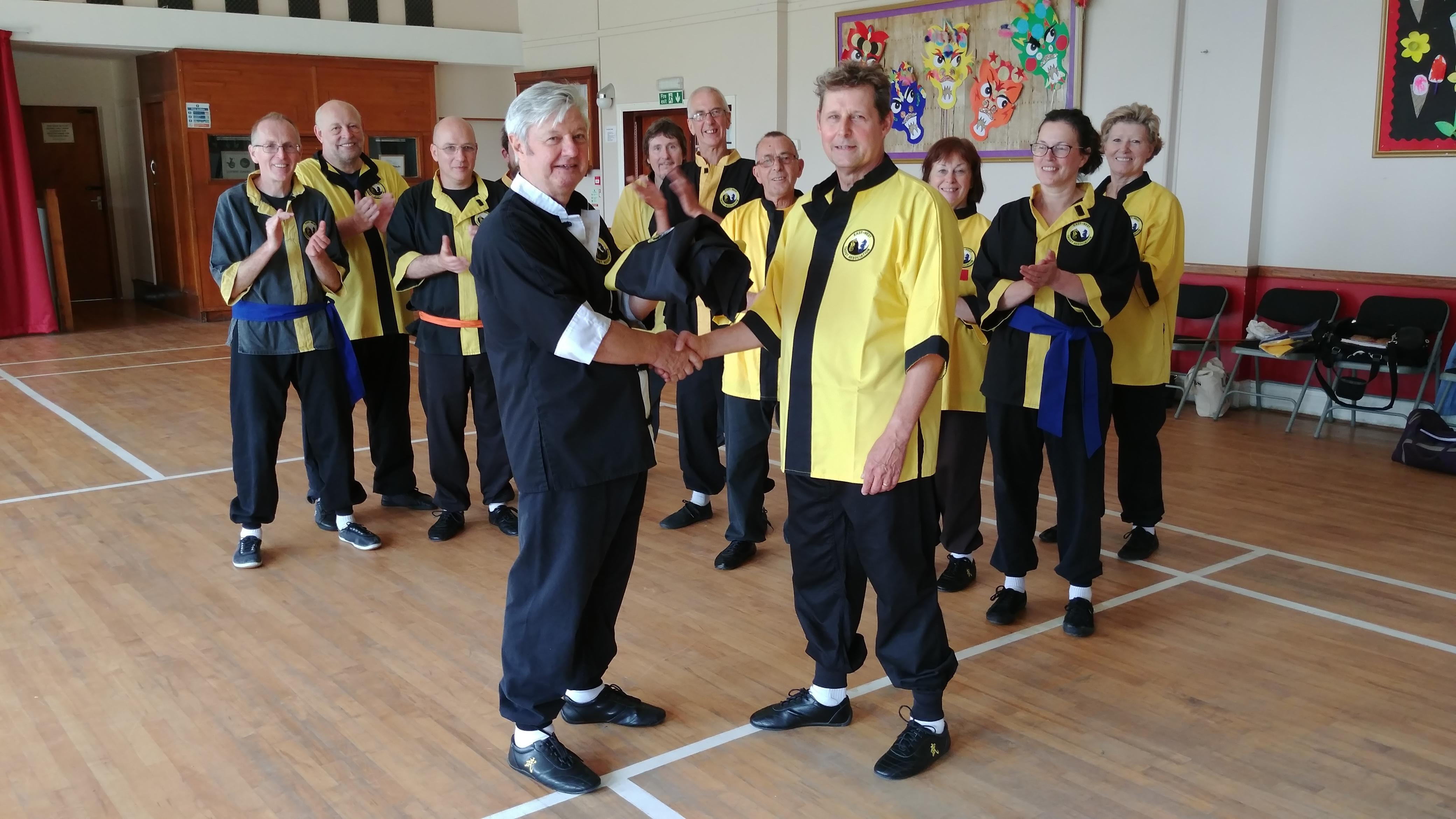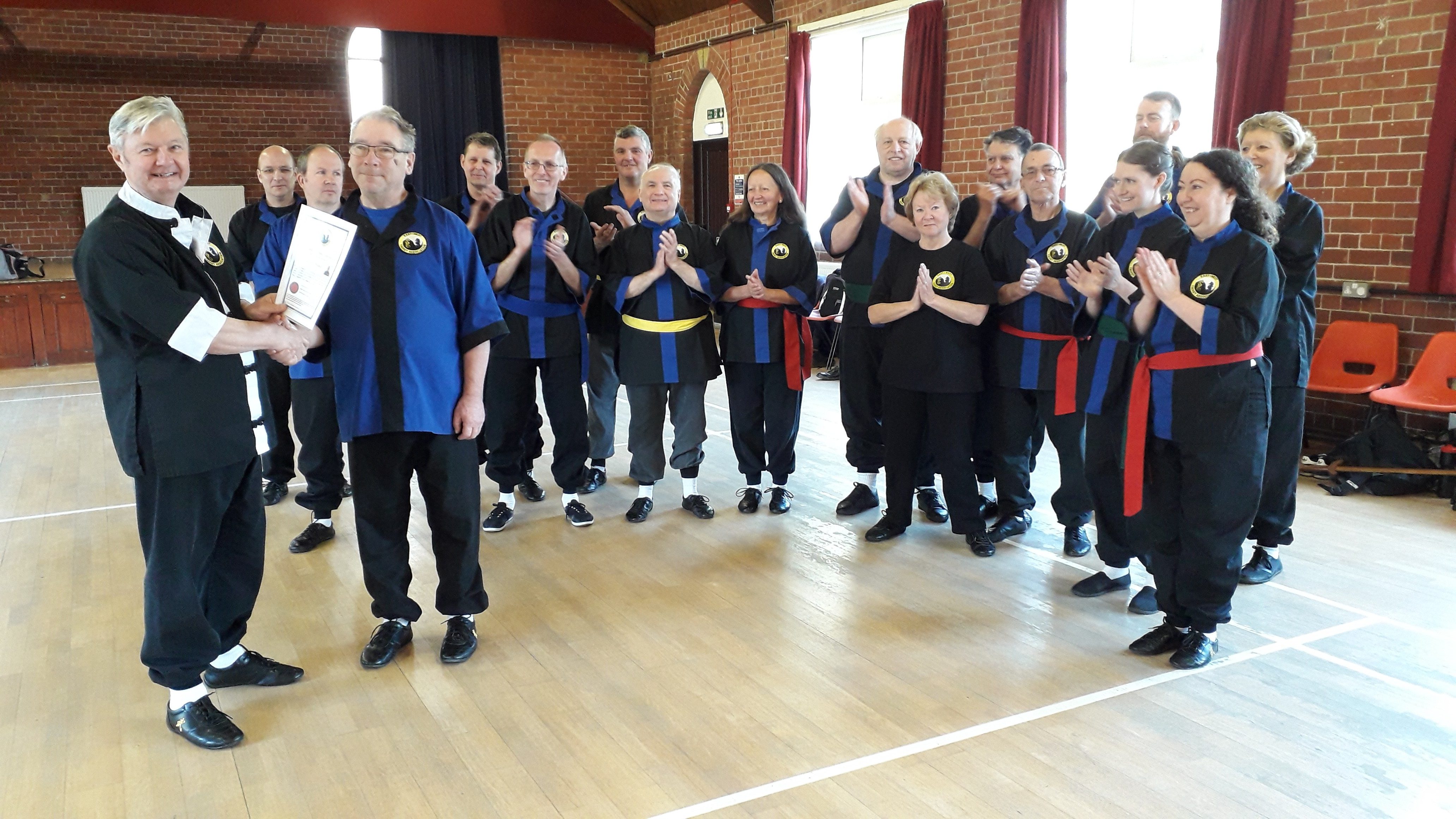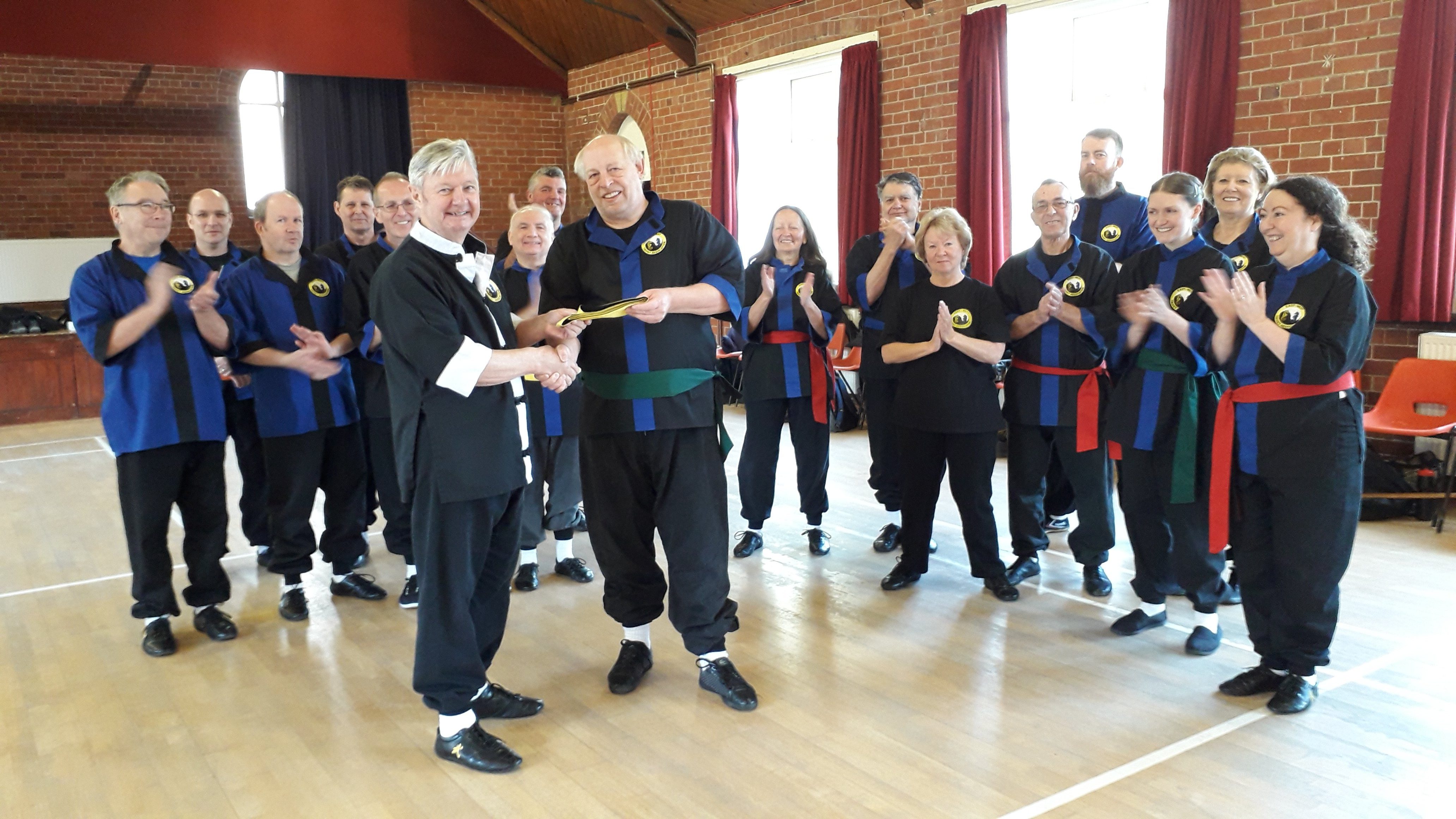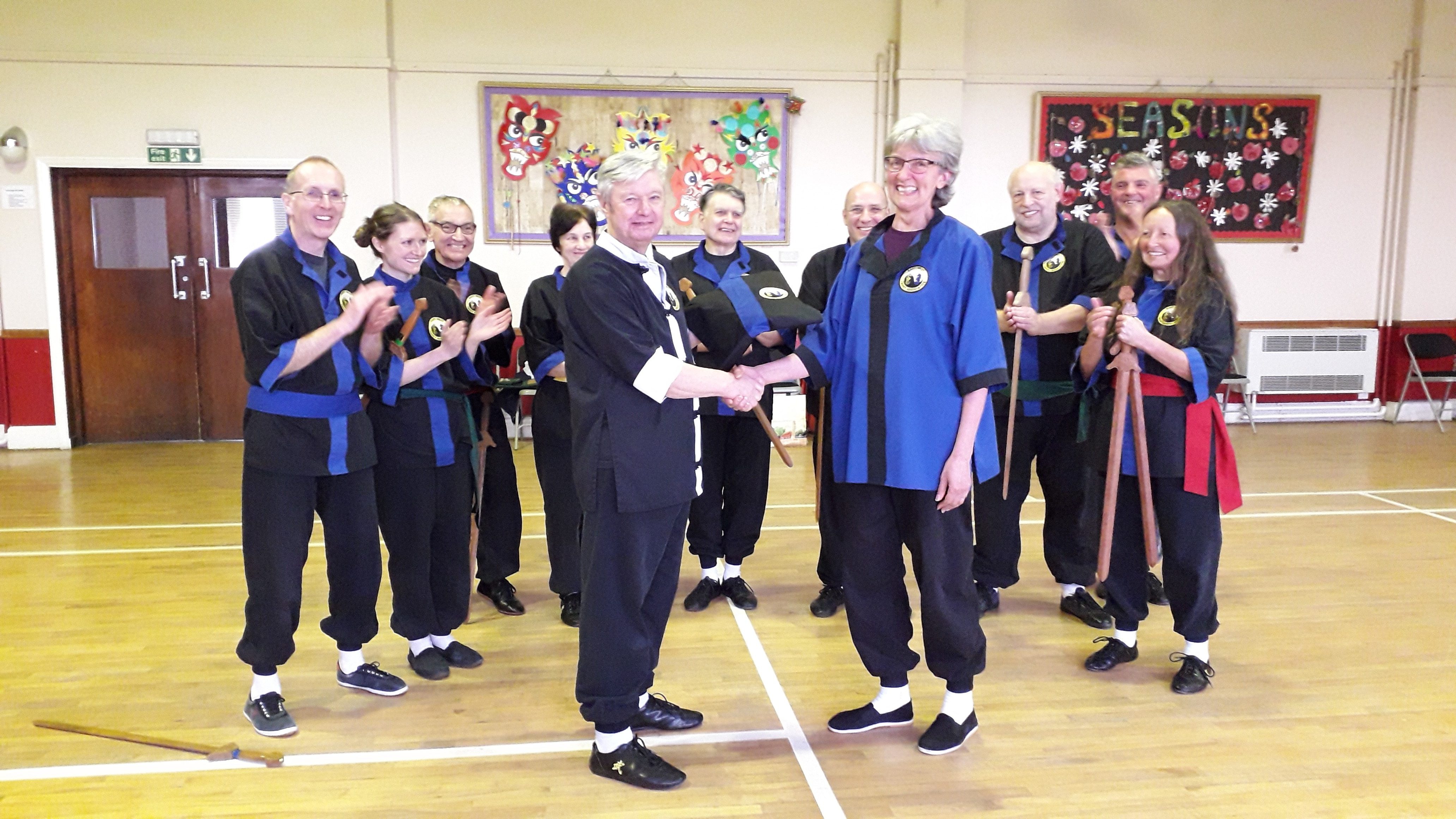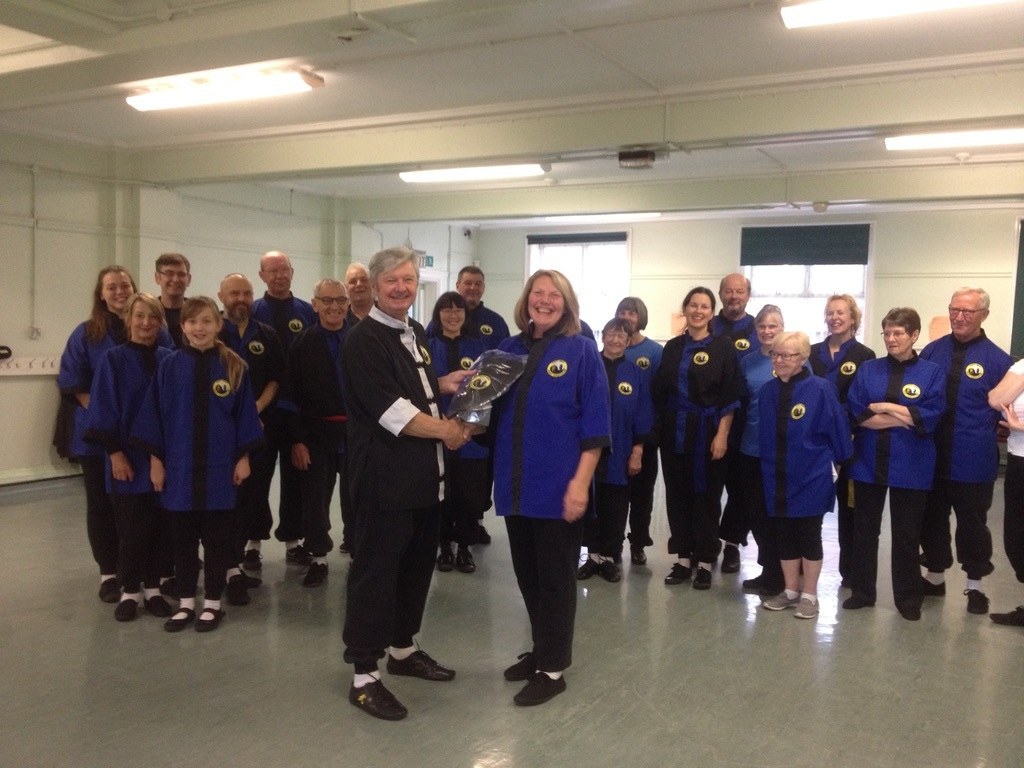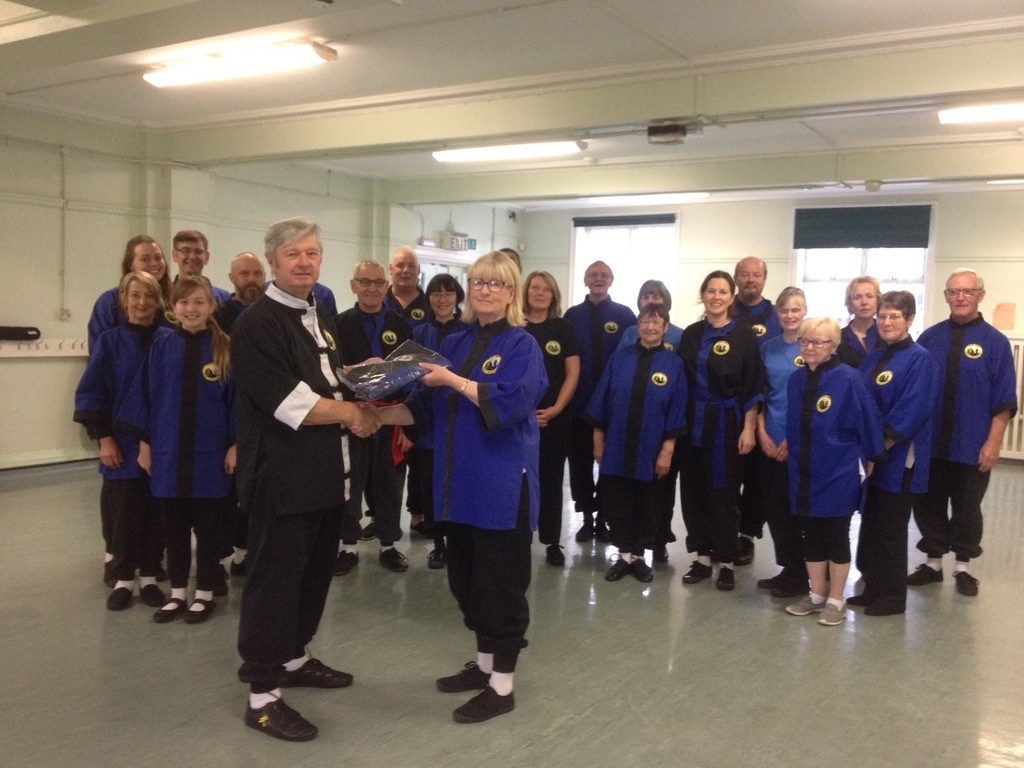I Fu Shou, also known as Sticky Hand or Adhering Hand is an extremely important aspect of the Taoist arts. Sets and forms can be practised individually or in groups, and much can be understood about the self through the practice of these. The practice of I Fu Shou, however, can only be practised with a partner and through this tactile medium one can develop a depth of sensitivity that seems paranormal. To the uninitiated, who try to explain it through the use of logic and physiology, it is a maze of contradictions. Known in some parts of China as the Enlightened Hand, the dedicated practice of this art opens up the practitioner to their powers of heightened sensitivity. These palpable skills are developed through the dedicated practice of I Fu Shou over a long period of time. Slowly, by being in constant contact with your partner, you will be able to perceive which leg carries most of their weight, if the weight is on the ball of the foot, the heel, the little toe edge or the instep. You will also know instantly if your partner becomes tense at all in any part of their body.
To practise I Fu Shou you will need a partner to practise with. Having found a willing participant you stand facing each other with the right foot ahead of the left, both knees are bent slightly with the body weight evenly distributed between both legs. The right foot is placed so that the instep of the right foot is close to, but not touching, the instep of your partner’s right foot. Then the right hand is raised in front of the chest, so that when your partner does the same the back of your wrists lightly touch together. The body can move in any desired direction but the feet must remain stationary at all times. If you have to lift your toes or heel off the floor, or move either foot in any direction, then you are considered to have lost control of your balance. Later, when some skill has been developed, the students will move the feet, but only to set patterns as instructed. This training is only taught to advanced students.
The contact through the hands can be varied to any part of the arm, which includes the fingers, hand, all of the arm, the shoulder and the shoulder blade. Another rule is that contact must – never be broken. You can slide the hand up and down your partner’s arms or rotate around them, even change hands if you wish, although initially only one hand is usually used – until you gain a little experience. When two hands are brought into play only one hand should be in contact at any one time, and if you wish to change hands, the second hand must always make contact before you remove the first so that contact is maintained throughout.
The object of the I Fu Shou exercise is to upset your partner’s balance. This is not because it is a competition with a winner and a loser. Although sadly I see that ‘Pushing Hands competitions’, with some Tai Chi Organisations subsequently advertising that one of their students won this or that section, presumably in the belief that this will attract more students to their organisation. The type of students that this attracts are the ones who want to win competitions and show off in front of a crowd. I feel this is a retrograde step that moves away from the spirit of Tai Chi. I do not consider that I Fu Shou should be presented as a form of competition, which inevitably breeds a winner and a loser. I consider it to be a voyage of self- discovery. The practice of which will enable the practitioner to develop a heightened state of awareness, firstly of themselves, then of others they come into contact with. There is nothing to lose but your ego. And the prize to be won is humility.
If you would like to read the complete book its here on amazon: Student of A Master
Perhaps by looking at the names given to this exercise we can understand the different philosophy behind them. Firstly, to ‘push’ this word is defined as meaning: to exert force on a thing, to move away from oneself or from the origin of the force. This in essence seems rather an aggressive attitude. This type of philosophy leads to ambition, desire, glorification of the self and the wish to make oneself superior. This inevitably leads to separation from the Tao(way). There is no harmony here, only conflict. ‘Sticky’ is defined as: tending or intended to stick or adhere. Adhere is defined as: stick fast to a surface, another substance, etc. Also, to behave according to; follow in detail or give support or allegiance.
These words explain the essence of the instruction I have received from my Master. He always taught me that once contact has been made it must be maintained, and that this contact should be light, so light in fact, that if a feather were to fall upon your arm it would sink under the weight of the feather. He also taught me that the object of the exercise was to follow the movements of your partner, not to force them to change the direction but to allow them to move their hand and arm in whatever way they wish. Learning to work within this framework whilst maintaining your own balance. Giving in to their force, which completely negates their strength and allows you to gently guide them in the direction they wish to go. Gently, helping them on their way. If you offer no resistance, then no matter how much force is used against you, it cannot restrict your freedom. By giving in to their force and offering no resistance your partner sacrifices their balance when they exert force against your arm. By this action they create a weakness within their posture that can be exploited allowing you to maintain your balance whilst upsetting theirs.
The object of this is not to gain power over your partner, but to learn to remain in control of your own balance whilst being put under pressure by your partner. This helps us to deal with the problems we encounter in everyday life without losing control and resorting to violence. And by violence I do not necessarily mean physical violence but also mental violence, which is the modern way to bully and make people fear you. Power hungry people weave their webs of mental manipulation, praying on the weak within our society – we are all weak at some time or another as we fall into our yin periods during our journey through life. There are no laws, that can be enforced effectively, that will eradicate this kind of mental violence, which we all have to suffer at some time or other at work, from parents, teachers and countless enthusiastic supporters of officialdom. We just have to learn to deal with it. We have to learn to take responsibility for ourselves. Instead of becoming physically or verbally violent, which can only escalate the conflict, we have to learn to absorb the energy thrown our way. In doing so we strengthen ourselves and weaken the perpetrator. More importantly we remain entire.
Through the constant practice of I Fu Shou your partner learns that the amount of pressure they can safely exert is in direct relationship to their balance, and not their physical strength. I am sure you can see the value in knowing your limitations. This is what your partner learns from his position, and you have the opportunity to learn the lesson too when the roles are reversed. When your partner applies pressure to your wrist and you give in to this, you must both maintain contact and as I mentioned earlier this must be light. As your partner slowly shifts his or her weight forward onto their front leg, they explore the limits of movement they have in this direction. They create muscle changes within their body as they move and with constant practice they will become aware of these muscle changes. They will also after much practice begin to feel any tension in their partner. If they do not move their weight forwards they do not explore their own limitations. However, if they push forwards too far and their partner does not resist but gives in correctly to their force, their balance will become unstable and their posture become weak. This is inevitable, if you want to learn how to keep your balance under pressure, you must first learn what it feels like to lose your balance. Or as my Master was fond of saying: “There are two sides to a coin, look at both sides to understand it fully.” If you have never allowed yourself willingly to be put under pressure to learn your own limitations; the Tao(way) will do it for you. The practice of I Fu Shou should not be taken lightly, but it should be enjoyed. It should be taken seriously, but it should be indulged in, as if at play. Like life, it is a serious business, but I believe life is meant to be enjoyed also. There is so much beauty in nature and other people. Yet so many prefer to see only what is visible to the eye, accepting what they see without question, never looking any deeper. There is an old Chinese saying: “You cannot tell how deep a pool is by looking at it.” You must jump in to see for yourself. Most people wear a mask. This they present to the world, afraid to show their true selves, for in doing so they know they will become vulnerable; and from this they hide. You need to look beneath the surface to see the real person.
If you continue to resist force with force your life will be one long struggle. You will endure constant conflict, day after day until you start to look inwards at yourself and stop blaming others for your constant misfortune. You must learn to take responsibility for yourself. Learn to look after yourself when life gets difficult by remaining entire. Learn to give in to forces that are greater than you, for you will only damage yourself by opposing them, creating more and more conflict in the process. Instead of looking only outwards at others faults, look inwards and explore your own imbalance, learn to recognise your own weaknesses and your own inner conflict. However, if you have the courage to look within to recognise your own shortcomings, then, and only then, can you start to eradicate them – make no mistake this takes real courage. If you persist in the illusion that you are perfect and everyone else is against you, your life will be one long miserable existence full of conflict. Those who would like to help others to make the world a better place must first learn to make themselves a better person. Once they have accomplished this task, helping others will be a natural progression. If they have not learnt to govern themselves first, any help they offer to others or any contribution they make to the government of the world will only add to the chaos. Can a blind man show others how to see properly?
I believe that within the practice of Tai Chi all the lessons of life are contained. And I practise it with as much fervour as I can muster. I have learnt much from my practice of Tai Chi, but there is much, much, more to learn. And the more I practise the more eager I become. For me, it is like a passionate love affair. And just as when one is in love the world seems a truly beautiful place, so to me the world with all its problems is still a beautiful place. The natural world in all its beauty and diversity was created by the Tao or God, whichever you prefer.. The problems are created by man’s greed. Always wanting more and more, never satisfied. Unable to see the beauty in nature he constantly seeks to please the senses. This pleasing of the senses is short lived and therefore must be constantly sought after. This leads inevitably to greed. My Master has always taught me that the yin comes before the yang. In other words you must give before you can receive. In serving others you serve yourself. Look after your car, make sure it has enough oil, water and fuel and it will serve you well. Try to save money by denying it oil and it will continue to run providing you replenish its fuel tank. But it is a false economy because the lack of oil will cause problems to the engine, the heart of the car. Before very long it will break down and cost a lot of money and time to repair. So if you really value your car, care for it properly and it will serve you well. So it is with our planet. If we pollute the water and the air whilst raping the Earth of its treasures, concerned only with our material development, either blind or just too greedy to care about the damage we are doing to the Earth’s ecosystem; we will slowly annihilate ourselves.
The same lessons are learned from I Fu Shou. When you practise I Fu Shou with your partner, your partner acts as a mirror image for you. Where you can see, and feel, their ambition and desire exposed in their will to win as they try to upset your balance. You see your own ambitions and desire to accomplish reflected before you. By learning to deny your own ambition and desires, you begin to see the futility of your partner’s wish to accomplish a goal i.e., upset your balance. By not responding to their force with force, you will learn to gently guide your partner whilst remaining in control of your own balance – please note that you gently guide, not push or force him, off balance – so that he may see the futility of his ambition and desire. So that he may see by your gentle and unresisting nature that it is his own force, without any consideration as to the effect it will have on his balance, which causes him to lose his equilibrium. Blinded by his own ambition and desire he loses awareness of his own physical body. To separate yourself in this way is to separate yourself from the Tao (way). For your physical body is the vehicle you have been given to make the journey through life. It needs to be kept in good working order and it must be under your complete control, for taking a journey in a vehicle that is out of control is folly. This jewel (your body) given to you by the supreme spirit should be cared for as best you can. If you gave someone the most precious gift you could possibly give them because you loved them so dearly, and if your loved one did not take care of your precious gift, would this not upset you?
Plunge your hand into water and the water gives way to accept the intrusion. Remove your hand and the water fills the space it occupied immediately. There is no space where your hand was and no evidence that it ever existed in that space. The important thing to remember is that it is the work you do in service to others whilst you live that is important. Once you depart this life you will be quickly forgotten.
The contact made with the earth through the feet is a very important aspect of I Fu Shou. There are many reasons for this and they incorporate the physical, mental and spiritual. On a physical level, it can be easily seen that if the contact with the ground is not good then the balance is obviously not going to be very stable. So we must use our mental facilities to keep track of our balance, which is dependent on the contact our feet have with the floor. If we lose our mental concentration, however briefly, we lose awareness of that contact our feet have with the floor and therefore our balance is easily upset.
Through the practice of I Fu Shou, on a spiritual level we are reminded that every time we give the brain complete autonomy it ignores the information given through the senses. It ignores the information given on the state of balance transferred from the feet. The brain now in complete control ignores the subtle changes in posture, movements of the joints and muscle changes within the body. The brain considers these purely automatic and merely a reaction to existing conditions. The brain is like a child that bullies others, given control usually either through fear, complacency or laziness, it takes over and looking to the future makes a judgement on what it wants to happen. After an analytical appraisal of existing conditions, the brain makes its calculation and then commands the body to obey its instructions. The problem here is that the brain is working on information, which is now based on the past and at best was only partial, omitting as it did the subtle information available through the senses. The brain has also made calculations as to a future event. It considers this event an inevitable conclusion based on its analysis of the situation. The only thing that has not entered the equation is the only thing that really matters, THE PRESENT.
Spiritually the only thing that matters is the present. To be able to live in the present totally is the aim of all those who aspire to follow the Tao(way). To be able to live moment-to-moment is the only way to learn the truth. The truth is all around us constantly, it is there for all to see. It is hidden from no one. Yet very few ever see it, for they persist in looking for it in the past, or searching for it in the future which has not yet been born. The truth is in the present and you must reach it through an understanding of yourself. If you do not understand who you are, how can you understand where you are? And if you do not understand where you are, how can you ever hope to understand the ever-changing conditions that surround you? Maintaining an awareness of the contact our feet have with the floor during our I Fu Shou practice is akin to the realisation that our experiences, through the medium of our physical bodies whilst our feet are firmly planted on Mother Earth, is all we have. If we lose contact with our own physical presence now, we cease to be. We are asleep. If we lose this contact and allow the brain to enter into a world of illusion that it creates through its analysis of the past, which is gone forever, then we lose contact with reality. For we are here on this earth, in this physical body, experiencing these sensations through the senses, this is how we learn. Not the learning of mathematics, physics, history etc. The type of learning we are discussing here is researching the self. Instead of looking outwards, we look inwards at ourselves. We recognise our own desires, ambitions, fears and the aggression we use in an effort to obtain what we want. We learn through the practice of I Fu Shou and other sections of Tai Chi to recognise these in ourselves first. And the practice of I fu Shou is particularly useful, working as we do with a partner who acts as a mirror image of ourselves for us, reflecting the desire, ambition, fear and the aggression we all have within us.
The first step is recognising that if these negative qualities exist in others, then they must surely exist in us also. We cannot deal with something that we refuse to admit exists. If we deny our own desire, ambition, fear and aggression, how are we to learn how to bring these under control? One must have the courage to make oneself vulnerable, to look at oneself clearly and see the work that needs to be done to improve the self, the courage to suffer the humiliation that will be heaped upon your shoulders by those who consider themselves without fault. In the eyes of some you will be weak, but if you persist, out of this weakness will be born strength as surely as day follows night. ‘The Meek Shall Inherit The Earth.’ And when you gain this strength, remember the road you travelled to get there. Be tolerant of others as you pass them along the road. If they laugh at you or swear and curse you, be tolerant because as Jesus said, `Forgive them for they know not what they do.’ On your path you will meet many sceptics along the road. You will pass them occasionally one at a time and at other times you will encounter groups of them, but your inner strength will sustain you. You will pass them not because you are travelling faster than they are. You will pass them because you are going the other way down the road in the opposite direction to them. Whilst they travel outwards seeking new and greater experiences with which to please their senses, you will be travelling inwards.
The truth is within yourself. So look inside yourself – do not be afraid. Find out who the real you is. Then you can start to follow your own true path in life, which is your own personal Tao (way). Be warned! You must be prepared to encounter many travellers going in the opposite direction, many of whom will mock and curse you, but among them will be some who will recognise the peace, serenity, love of mankind and the love for all God’s creatures that you are trying to cultivate. Some will listen to your advice. Some will scorn it. Accept both! Be grateful for the opportunity to help some, and have pity for those that are not able to see the truth. We must never judge others because we do not know their path. We are only human, not divine, and therefore our understanding is always limited. So suffer the scorn and accept the thanks. The yin and yang exists in everything.
When we train in the discipline of I Fu Shou we are developing sensitivity. This training has a depth that, like the Tao, is infinite. It is a fascinating journey of self-discovery. We start by looking at ourselves. Through the practice of I Fu Shou we slowly become aware of our subtle muscular changes as we transfer our weight from one leg to the other. We become aware of our weight distribution on each foot and exactly where on the foot most of the weight is, the ball of the foot, the heel, the instep or the little toe edge. The mind is brought under control and made aware of the body’s subtle movements. In this way the physical body and the mind are harmonised. When we are familiar with our own movements and are able to harmonise the body and mind, we can then concentrate on paying attention to the movements our partners are making, learning to respond to these movements, rather than control our own movements whilst endeavouring to control theirs at the same time, and simultaneously attempting to upset their balance.
Let us look at the above paragraph and expand on it a little. If we try to simultaneously: control our own movements, whilst analysing our partner’s, then calculating the reaction, proceed to execute the necessary action to upset our partner’s balance. Is this not an impossible task? Indeed it is. What has happened here is that we have allowed the brain to take control. The brain is considered sacrosanct in the western world. It is revered, considered supreme over our other human attributes. It is not! It is a tool that has great use, but it is only a tool like the many other attributes that we have at our disposal. And we must learn to harmonise them for greatest efficiency. Like the fingers on our hands, each finger is separate in its own right, but it is still part of the hand. And while each finger can operate separately, it must harmonise with the others to make the hand useful. Given complete autonomy the brain darts from one thought to another, completely out of control, just like the unruly child who will not harmonise with those around it, but seeks to control by creating chaos. The brain, like the unruly child, must be disciplined and made to harmonise with the body’s other attributes. Otherwise we are like the car driver who takes a car out on the open road without having learnt how to control it first. With some difficulty we start the car, manage to get it into gear and hurtle off down the road to the noise of crunching gears and screeching tyres. We have thought about where we want to go, we look eagerly at the road ahead as we hurtle along. Devoid of authority over the car’s controls, we career downhill, a danger to ourselves and all others in our path. If we want to learn to drive properly we must seek the instruction of another who has the skill and ability to teach us properly. So it is with I Fu Shou and the other sections of Tai Chi. One needs the instruction of a skilled practitioner, if one is to proceed down the right path. These things cannot be learnt from a book, because a book can only teach you on a very superficial level. Only a teacher who has travelled the road can instruct you properly. Otherwise you will travel many miles down the wrong road before realising that the wrong path has been taken. Training with a partner who also has not had correct instruction is like the blind leading the blind.
So where does one find a teacher? It is said that: ‘When the student is ready the master will appear.’ Many people consider themselves ready for spiritual training and go in search of a teacher. They may travel the whole world seeking the ultimate teacher only to find that they must start at the beginning, with themselves. Then, when the Tao sees that you are a conscientious and serious seeker of truth a teacher will appear and be seen for who he is. One must empty one’s mind to see and hear clearly. If one’s mind is full of ambition, greed and desire, it will inevitably colour what one sees and hears, it will inevitably blind one to the truth. If you are unable to see yourself for who you are, you will be unable to recognise a real teacher should you meet one.

